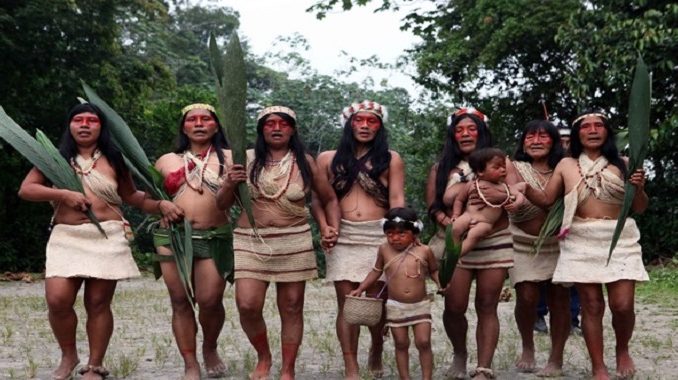
This is the first case involving indigenous peoples in voluntary isolation.
The Inter-American Commission on Human Rights (IACHR) presented on September 30, 2020 in the Inter-American Court of Human Rights (Inter-American Court) the case of the violations of the rights of the Indigenous Peoples in Voluntary Isolation Tagaeri and Taromenane by the Ecuadorian State .
The case refers to the international responsibility of the State, within the framework of projects that affect its territories, natural resources and way of life. It also refers to three groups of acts of violent deaths of members of these peoples that occurred in 2003, 2006 and 2013; and the lack of adequate protection measures in relation to two Taromenane girls after the events of 2013.
The Tagaeri and Taromenane are indigenous peoples in voluntary isolation (“PIAV”) who have chosen to live without maintaining contact with the majority population. They are also known as ecosystem peoples because they live in a strict relationship of dependence with their ecological environment. These peoples live according to a pattern of seasonal mobility in a wide territory that allows them to exercise their gathering and hunting activity, as well as the search for places related to their ancestors. Due to this strict dependence on the ecosystem, any change in the natural habitat can harm both the physical survival of its members and as an indigenous people itself.
In its Merits Report, the IACHR analyzed the state obligations regarding the territorial rights of the Tagaeri and Taromenane, their normative regulation, the form of recognition through the creation of a natural reserve, and the level of protection of indigenous property with respect to of third parties with interests in the use and exploitation of the territories.
Regarding the first point, the Commission concluded that the ancestral territory of the Tagaeri and Taromenane peoples exceeds the limits of the Tagaeri and Taromenane Intangibility Zone (“ZITT”) and that the State did not demonstrate that there is correspondence between the delimitation of the ZITT and the ancestral territory of the Tagaeri and Taromenane peoples.
Likewise, the commission found that the seasonal patterns of planting and harvesting have not been taken into account, generating contacts, affecting their subsistence and the concession and exploitation of their intangible territories to companies.
In addition, the IACHR established that, taking into consideration the principle of non-contact and that of self-determination of the PIAVs, it is not possible to intervene in their territories for economic use when this could be in tension with the safeguarding of their subsistence.
The IACHR observed that although the ZITT was kept intangible in the authorization process for two mining projects, the delimitation of the ZITT was not consistent with the territory ancestrally occupied by the PIAV.
The Commission concluded that the legal protection of intangibility was not effective and that, when applied to the specific case, said regulations failed to guarantee that any restriction on the ownership of the PIAV was compatible with the applicable standards.
The report indicates that there were illegal interventions by settlers and loggers in their areas. In addition, the state obligation to guarantee the right of indigenous peoples was violated, to effectively control and have the domain and use of their territory without any type of interference from third parties.
Regarding the violent deaths of members of the Tagaeri and Taromenane peoples that occurred in 2003, 2006 and 2013, the IACHR observed that the three events are the result of contacts between third parties and the PIAV, due to the aforementioned lack of effective guarantees to prevent third-party access to the territory.
In its Report, the Commission determined that the State was aware of the situation of real and immediate risk, but did not adopt reasonable measures to prevent it from being verified. Therefore, it concluded that the Ecuadorian State is responsible for the failure to prevent these deaths.
Review the recommendations of the IACHR to the Ecuadorian State: IACHR Report

Be the first to comment